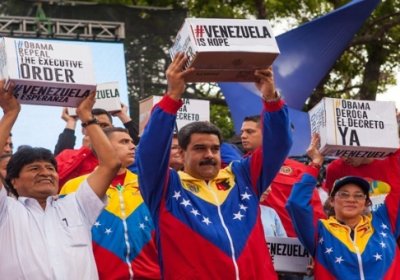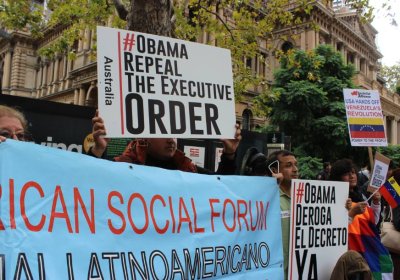 President Nicolas Maduro of Venezuela began his visit to Panama City for the Summit of the Americas with a visit to the impoverished neighbourhood of El Chorrillo to lay a wreath at the monument to those killed by the US bombing of the community during the 1989 US invasion of Panama.
The seventh Summit of the Americas, held in Panama City on April 10 and 11, was widely hailed as a victory for left-leaning and progressive forces in the region, particularly Venezuela and Cuba.
President Nicolas Maduro of Venezuela began his visit to Panama City for the Summit of the Americas with a visit to the impoverished neighbourhood of El Chorrillo to lay a wreath at the monument to those killed by the US bombing of the community during the 1989 US invasion of Panama.
The seventh Summit of the Americas, held in Panama City on April 10 and 11, was widely hailed as a victory for left-leaning and progressive forces in the region, particularly Venezuela and Cuba.
Barack Obama
 President Nicolas Maduro of Venezuela began his visit to Panama City for the Summit of the Americas with a visit to the impoverished neighbourhood of El Chorrillo to lay a wreath at the monument to those killed by the US bombing of the community during the 1989 US invasion of Panama.
The seventh Summit of the Americas, held in Panama City on April 10 and 11, was widely hailed as a victory for left-leaning and progressive forces in the region, particularly Venezuela and Cuba.
President Nicolas Maduro of Venezuela began his visit to Panama City for the Summit of the Americas with a visit to the impoverished neighbourhood of El Chorrillo to lay a wreath at the monument to those killed by the US bombing of the community during the 1989 US invasion of Panama.
The seventh Summit of the Americas, held in Panama City on April 10 and 11, was widely hailed as a victory for left-leaning and progressive forces in the region, particularly Venezuela and Cuba.
A group of Australian academics, unionists, politicians, and others have urged the US to “stop interfering in Venezuela’s domestic affairs”. More than 70 prominent Australian progressives issued an open letter to US President Barack Obama condemning US sanctions against Venezuela on April 9.
The letter, initiated by the Venezuelan Solidarity Campaign in Melbourne, is printed below. The letter was handed to US consulates in Sydney and Melbourne on April 10.
* * *
No more coups! No more interventions! Repeal the Executive Order!
Dear Mr President,
The United States is providing crucial support to regional ally Saudi Arabia ― a big buyer of US arms ― as it launches a new war in the Middle East by attacking neighbouring Yemen.
A Saudi-led coalition of Western-aligned, mainly Sunni Islamist, Arab government's launched air, naval and ground military offensive against Yemen on March 25.
Saudi Arabian forces are being supported by military planes from the United Arab Emirates, Qatar, Bahrain, Kuwait, Jordan, Morocco, Sudan and Egypt, which is also supplying naval forces.
Venezuelan President Nicolas Maduro, along with his Bolivian counterpart Evo Morales, received a petition with 10 million signatures against U.S. President Barack Obama's executive order labelling the country as a “security treat” on April 9.
After the decree was issued, Maduro launched a campaign seeking 10 million signatures from Venezuelans demanding the decree be repealed, saying he would present them to the U.S. President Barack Obama at the April 10-11 Summit of the Americas in Panama.
US President Barack Obama admitted on April 9 that Venezuela “does not pose a threat” to the United States.
“We do not believe that Venezuela poses a threat to the United States, nor does the United States threaten the Venezuelan government,” Obama said during an interview with EFE.
Last month, Obama signed an executive order declaring Venezuela an “unusual and extraordinary threat to the national security and foreign policy of the United States.”
The Venezuelan government-initiated campaign calling for US President Barack Obama to repeal his executive order that arbitrarily declares Venezuela an "extraordinary threat" to US "national security" had more than 6 million signatures as March 31.
Venezuelan President Nicolas Maduro announced on his weekly television program that the campaign has collected 6.2 million signatures so far. “I believe that Obama's threat has awoken a great amount of love for what we are going for in our country,” said Maduro.
Since US President Barack Obama's administration decided to impose new sanctions on Venezuela on March 9, many people, including journalists, have asked what motivated them to do this.
Some are curious over the apparent inconsistency between this move and the White House decision in December to begin normalising relations with Cuba. Others are wondering why the Obama administration would do something that so obviously hurts the United States-backed opposition in Venezuela, at least in the short run.
As Palestinians continue to face economic hardships and services and housing shortages after the Israeli bombardments last year, dozens of Gazans joined a rally on March 21 in solidarity with Venezuela.
TeleSUR’s correspondent in Gaza, Noor Harazeen, reported from the rally that attendees were calling for the US to keep its hands off Venezuela.
The event was organised by the Popular Front for the Liberation of Palestine (PFLP), and several Palestinian officials attended, including Sami Abu Zuhri from Hamas.
On March 9, US President Barack Obama issued an excutive order imposing more sanctions of Venezuelan officals and declaring the oil-rich nation a “national security threat”. It came after a long period of often violent right-wing protests and economic shortages facing the left-wing Chavista governmetn of President Nicolas Maduro.
Emergency summits of the Organisation of American States (OAS), the Union of South American Nations (UNASUR) and the Bolivarian Alliance of Our Americas (ALBA) have rejected US attacks on Venezuela and offered the South American nation support.
TeleSUR English reported that a large majority of delegates at an emergency OAS meeting expressed concern about US President Barack Obama's March 9 “executive order” declaring Venezuela a threat and “national emergency”.
US hemispheric policy reached a new low on March 9 when President Barack Obama invoked emergency powers to declare “a national emergency with respect to the unusual and extraordinary threat to the national security and foreign policy of the United States posed by the situation in Venezuela.”
Thanks to Obama’s action, the US has now blatantly rehabilitated its traditional imperial posture towards the South and challenged the continent-wide Bolivarian cause of Latin American and Caribbean independence and sovereignty.
US President Barack Obama issued an Executive Order regarding Venezuela on March 9 that escalated US attacks on Venezuela's left-wing government.
The order amounts to an act of aggression against Venezuela's sovereignty by declaring a “national emergency” based on claims the oil-rich South American nation threatens US national security due to alleged human rights violations and corruption.
- Previous page
- Page 3
- Next page









